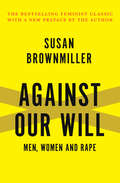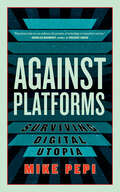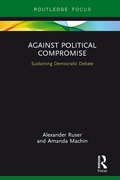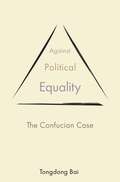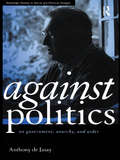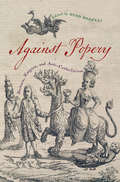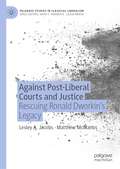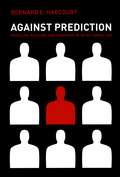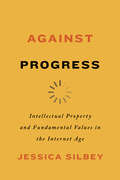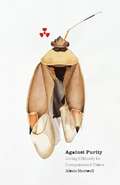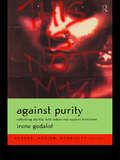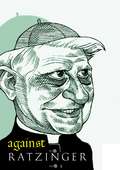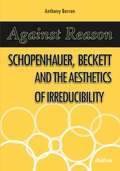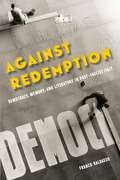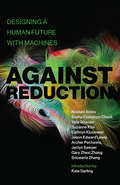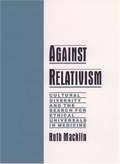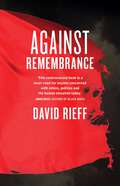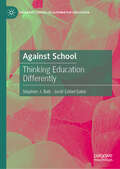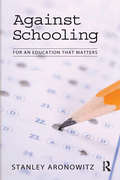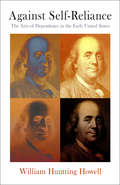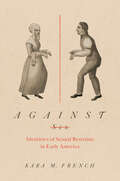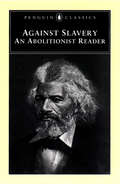- Table View
- List View
Against Our Will: Men, Women and Rape (Pelican Ser.)
by Susan BrownmillerSusan Brownmiller&’s groundbreaking bestseller uncovers the culture of violence against women with a devastating exploration of the history of rape—now with a new preface by the author exposing the undercurrents of rape still present todayRape, as author Susan Brownmiller proves in her startling and important book, is not about sex but about power, fear, and subjugation. For thousands of years, it has been viewed as an acceptable &“spoil of war,&” used as a weapon by invading armies to crush the will of the conquered. The act of rape against women has long been cloaked in lies and false justifications.It is ignored, tolerated, even encouraged by governments and military leaders, misunderstood by police and security organizations, freely employed by domineering husbands and lovers, downplayed by medical and legal professionals more inclined to &“blame the victim,&” and, perhaps most shockingly, accepted in supposedly civilized societies worldwide, including the United States.Against Our Will is a classic work that has been widely credited with changing prevailing attitudes about violence against women by awakening the public to the true and continuing tragedy of rape around the globe and throughout the ages.Selected by the New York Times Book Review as an Outstanding Book of the Year and included among the New York Public Library&’s Books of the Century, Against Our Will remains an essential work of sociological and historical importance.
Against Perfectionism
by Steven LecceIn a democracy, political authority should be determined independently of religious, philosophical, and ethical ideals that often divide us. This idea, called liberal neutrality, challenges one of the oldest insights of the Western philosophical tradition in politics. At least since Plato, the concept of perfectionism has insisted that statecraft is akin to "soulcraft," and political questions about the justification of state power have followed from ethical questions about what is valuable in life and about how we should live if we are to live well. Against Perfectionism defends neutralist liberalism as the most appropriate political morality for democratic societies. Steven Lecce investigates the theoretical foundations of liberalism, bringing together classic and contemporary arguments about the implications of pluralism for liberal equality. He surveys three classic debates over the grounds and limits of tolerance, and investigates the limits of perfectionism as a guide to law and public policy in pluralist societies. Lecce ultimately suggests a version of neutrality that answers the critiques recently leveled against it as a political ideal. Presenting sophisticated and groundbreaking arguments, Against Perfectionism is a call to rethink current concepts of law and public policy in democratic societies.
Against Platforms: Surviving Digital Utopia (Activist Citizens Library)
by Mike PepiA bold and imaginative critique of the hidden costs of digital life – and a manifesto for a better future . . .At the turn of the millennium, digital technologies seemed to have immense promise for transforming our society. With these powerful new tools, the thinking went, we would be free to live our best lives, connected to our communities in ways full of infinite potential.A quarter of a century on, this form of utopianism seems like a cruel mirage. Our lives are more fragmented and pressure-filled as ever, as we race to keep up with technologies that manipulate, command, and drain us at every turn. So what happened? In Against Platforms, technologist and creator Mike Pepi lays out an explanation of what went wrong – and a manifesto for putting it right.The key, says Pepi, is that we have been taught that digital technologies are neutral tools, transparent, easily understood, and here to serve us. The reality, Pepi says, is that they are laden with assumptions and collateral consequences – ideology, in other words. And it is this hidden ideology that must be dismantled if we are to harness technology for the fullest expression of our humanity.
Against Political Compromise: Sustaining Democratic Debate
by Alexander Ruser Amanda MachinPolitical compromise is emerging as a preferred solution for numerous apparently intractable problems. Many have pointed to the rising degree of political polarisation around issues such as climate change, immigration and abortion. These are ‘wicked problems’ that are clearly not conducive to any sort of political consensus. The groups and individuals who are party to these issues disagree, often both fully and fiercely. As an alternative, political compromise seemingly offers a way of respecting difference while simultaneously generating a decision upon which policy can move forward. But proponents of political compromise should also acknowledge its significant weaknesses and dangers. Invoking recent examples from various policy areas to illustrate their claims, the authors assert that compromise can disguise inequality, reduce plurality and heighten uncertainty. In short, compromise can weaken democracy and must not be seen as some sort of political panacea. This concise, accessible text offers a strong and provocative argument that provides a crucial counterpoint to the promise of compromise. It should prove of interest to students and scholars interested in compromise and consensus as well as democratic governance, social inequality, political apathy and environmental politics.
Against Political Equality: The Confucian Case (The Princeton-China Series #10)
by Tongdong BaiWhat might a viable political alternative to liberal democracy look like? In Against Political Equality, Tongdong Bai offers a possibility inspired by Confucian ideas.Bai argues that domestic governance influenced by Confucianism can embrace the liberal aspects of democracy along with the democratic ideas of equal opportunities and governmental accountability to the people. But Confucianism would give more political decision-making power to those with the moral, practical, and intellectual capabilities of caring for the people. While most democratic thinkers still focus on strengthening equality to cure the ills of democracy, the proposed hybrid regime—made up of Confucian-inspired meritocratic characteristics combined with democratic elements and a quasi-liberal system of laws and rights—recognizes that egalitarian qualities sometimes conflict with good governance and the protection of liberties, and defends liberal aspects by restricting democratic ones. Bai applies his views to the international realm by supporting a hierarchical order based on how humane each state is toward its own and other peoples, and on the principle of international interventions whereby humane responsibilities override sovereignty.Exploring the deficiencies posed by many liberal democracies, Against Political Equality presents a novel Confucian-engendered alternative for solving today’s political problems.
Against Politics: On Government, Anarchy and Order (Routledge Studies in Social and Political Thought)
by Anthony De JasayIs the state a necessity, a convenience, or neither? It enforces collective choices in which some override the preferences and dispose of the resources of others. Moreover, collective choice serves as its own source of authority and preempts the space it wishes to occupy. The morality and efficacy of the result are perennial questions central to political philosophy.In Against Politics Jasay takes a closely reasoned stand, based on modern rational choice arguments, for rejecting much of mainstream thought about these matters. In the first part of the book, Excuses, he assesses the standard justification of government based consent, the power of constitutions to achieve limited government, and ideas for reforming politics. In the second part, Emergent Solutions , he explores the force of first principles to secure liberties and rights and some of the potential of spontaneous conventions for generating ordered anarchy.Written with clarity and simplicity, this powerful volume represents the central part of Jasay's recent work. Fully accessible to the general reader, it should stimulate the specialist reader to fresh thought.
Against Popery: Britain, Empire, and Anti-Catholicism (Early American Histories)
by Tim Harris Andrew R. Murphy Gregory Smulewicz-Zucker Anthony Milton Brendan McConville Laura M. Stevens Susan P. Liebell Clare Haynes Cynthia J. Van Zandt Craig Gallagher Peter W. WalkerAlthough commonly regarded as a prejudice against Roman Catholics and their religion, anti-popery is both more complex and far more historically significant than this common conception would suggest. As the essays collected in this volume demonstrate, anti-popery is a powerful lens through which to interpret the culture and politics of the British-American world. In early modern England, opposition to tyranny and corruption associated with the papacy could spark violent conflicts not only between Protestants and Catholics but among Protestants themselves. Yet anti-popery had a capacity for inclusion as well and contributed to the growth and stability of the first British Empire. Combining the religious and political concerns of the Protestant Empire into a powerful (if occasionally unpredictable) ideology, anti-popery affords an effective framework for analyzing and explaining Anglo-American politics, especially since it figured prominently in the American Revolution as well as others.Taking an interdisciplinary approach, written by scholars from both sides of the Atlantic working in history, literature, art history, and political science, the essays in Against Popery cover three centuries of English, Scottish, Irish, early American, and imperial history between the early sixteenth and early nineteenth centuries. More comprehensive, inclusive, and far-reaching than earlier studies, this volume represents a major turning point, summing up earlier work and laying a broad foundation for future scholarship across disciplinary lines.Contributors: Craig Gallagher, New England College * Tim Harris, Brown University * Clare Haynes, Independent Researcher * Susan P. Liebell, St. Joseph’s University * Brendan McConville, Boston University * Anthony Milton, University of Sheffield * Andrew R. Murphy, Virginia Commonwealth University * Gregory Smulewicz-Zucker, Rutgers University, New Brunswick * Laura M. Stevens, University of Tulsa * Cynthia J. Van Zandt, University of New Hampshire * Peter L. Walker, University of WyomingEarly American Histories
Against Post-Liberal Courts and Justice: Rescuing Ronald Dworkin’s Legacy (Palgrave Studies in Classical Liberalism)
by Lesley A. Jacobs Matthew McManusThis book covers how Liberal institutions – constitutional democracy, economic markets, liberal courts, free trade, international human rights – around the world are under assault by the political right and we are witnessing the emergence of post-liberal institutions. These post-liberal institutions are founded on the core conviction that the actions of liberal institutions including the United States Supreme Court are patently unjust. This volume makes the case against post-liberal courts and justice by reconnecting to the principles of moral equality and dignified freedom for all. The intention is to show how there is great untapped potential in the work of Ronald Dworkin’s work to demonstrate that it can help progressive liberals think through the great issues of the day and respond to the contemporary criticisms of the political right. The core themes are concretely illustrated by focusing on some of the most controversial recent post-liberal decisions of the Supreme Court, ranging from election funding to abortion to race-sensitive affirmative action, to economic inequality in an age of increasingly unequal opportunities.
Against Prediction: Profiling, Policing, and Punishing in an Actuarial Age
by Bernard E. HarcourtFrom random security checks at airports to the use of risk assessment in sentencing, actuarial methods are being used more than ever to determine whom law enforcement officials target and punish. And with the exception of racial profiling on our highways and streets, most people favor these methods because they believe they’re a more cost-effective way to fight crime. In Against Prediction, Bernard E. Harcourt challenges this growing reliance on actuarial methods. These prediction tools, he demonstrates, may in fact increase the overall amount of crime in society, depending on the relative responsiveness of the profiled populations to heightened security. They may also aggravate the difficulties that minorities already have obtaining work, education, and a better quality of life—thus perpetuating the pattern of criminal behavior. Ultimately, Harcourt shows how the perceived success of actuarial methods has begun to distort our very conception of just punishment and to obscure alternate visions of social order. In place of the actuarial, he proposes instead a turn to randomization in punishment and policing. The presumption, Harcourt concludes, should be against prediction.
Against Progress: Intellectual Property and Fundamental Values in the Internet Age
by Jessica SilbeyWhen first written into the Constitution, intellectual property aimed to facilitate "progress of science and the useful arts" by granting rights to authors and inventors. Today, when rapid technological evolution accompanies growing wealth inequality and political and social divisiveness, the constitutional goal of "progress" may pertain to more basic, human values, redirecting IP's emphasis to the commonweal instead of private interests. Against Progress considers contemporary debates about intellectual property law as concerning the relationship between the constitutional mandate of progress and fundamental values, such as equality, privacy, and distributive justice, that are increasingly challenged in today's internet age. Following a legal analysis of various intellectual property court cases, Jessica Silbey examines the experiences of everyday creators and innovators navigating ownership, sharing, and sustainability within the internet eco-system and current IP laws. Crucially, the book encourages refiguring the substance of "progress" and the function of intellectual property in terms that demonstrate the urgency of art and science to social justice today.
Against Purity: Living Ethically in Compromised Times
by Alexis ShotwellThe world is in a terrible mess. It is toxic, irradiated, and full of injustice. Aiming to stand aside from the mess can produce a seemingly satisfying self-righteousness in the scant moments we achieve it, but since it is ultimately impossible, individual purity will always disappoint. Might it be better to understand complexity and, indeed, our own complicity in much of what we think of as bad, as fundamental to our lives? Against Purity argues that the only answer—if we are to have any hope of tackling the past, present, and future of colonialism, disease, pollution, and climate change—is a resounding yes. Proposing a powerful new conception of social movements as custodians for the past and incubators for liberated futures, Against Purity undertakes an analysis that draws on theories of race, disability, gender, and animal ethics as a foundation for an innovative approach to the politics and ethics of responding to systemic problems. Being against purity means that there is no primordial state we can recover, no Eden we have desecrated, no pretoxic body we might uncover through enough chia seeds and kombucha. There is no preracial state we could access, no erasing histories of slavery, forced labor, colonialism, genocide, and their concomitant responsibilities and requirements. There is no food we can eat, clothes we can buy, or energy we can use without deepening our ties to complex webbings of suffering. So, what happens if we start from there? Alexis Shotwell shows the importance of critical memory practices to addressing the full implications of living on colonized land; how activism led to the official reclassification of AIDS; why we might worry about studying amphibians when we try to fight industrial contamination; and that we are all affected by nuclear reactor meltdowns. The slate has never been clean, she reminds us, and we can&’t wipe off the surface to start fresh—there&’s no fresh to start. But, Shotwell argues, hope found in a kind of distributed ethics, in collective activist work, and in speculative fiction writing for gender and disability liberation that opens new futures.
Against Purity: Rethinking Identity with Indian and Western Feminisms (Gender, Racism, Ethnicity Ser.)
by Irene GedalofAgainst Purity confronts the difficulties that white Western feminism has in balancing issues of gender with other forms of difference, such as race, ethnicity and nation. This pioneering study places recent feminist theory from India in critical conversation with the work of key Western thinkers such as Butler, haraway and Irigaray and argues that, through such postcolonial encounters, contemporary feminist thought can begin to work 'against purity' in order to develop more complex models of power, identity and the self, ultimately to redefine 'women' as the subject of feminism.Theoretically grounded yet written in an accessible style, this is a unique contribution to ongoing feminist debates about identity, power and difference.
Against Ratzinger
by Antony ShugaarPublished anonymously in Italy on the one-year anniversary of Ratzinger's election to the papacy, Against Ratzinger caused a national stir and immediately shot onto bestseller lists. Now America, the home of over 67 million Catholics, will have the opportunity to wrestle with this insightful and revealing examination of Pope Benedict XVI. This concise volume analyzes and critiques the pronouncements of Ratzinger. Addressing some of the most dramatic and pressing issues of our time, Against Ratzigner studies the Pope's responses to birth control, abortion, and sexual abuse in the Church. Against Ratzinger charts Ratzinger's rise to power from his arrival in Rome in 1981 and addresses his close relationship with the late Pope John Paul II.
Against Reason: Schopenhauer, Beckett and the Aesthetics of Irreducibility
by Anthony BarronAnthony Barron explores the relationship between the philosophy of Schopenhauer and the forms and themes of Beckett's critical and creative writings. He shows that Beckett's aesthetic preoccupations are consonant with some of Schopenhauer's seminal arguments regarding the arational basis of artistic composition and appreciation and the impotence of reason in human affairs. While Beckett's critical writings are, in places, formidably opaque, this work examines the ways in which such texts can be elucidated when their intertextual affinities with Schopenhauer's arguments are revealed. Using Schopenhauer's thought as a presiding interpretative framework, Barron demonstrates how the widespread presence of philosophical and theological ideas in Beckett's creative texts signifies less about his personal convictions than it does about his authorial aims. He thereby highlights the ways in which discursive ideas were appropriated and manipulated by Beckett for purely literary ends. <P><P>A central contention of this book is that to judge the place of ideas within Beckett's art, we should ignore questions of their theoretical persuasiveness and consider their role as purely aesthetic devices, the value of which is revealed in terms of the existential impact they have upon his characters. In each of the chapters that deal with Beckett's fiction, Barron underscores the artistically energizing tensions that exist between the concepts that Beckett's characters invoke in their attempts to comprehend the import of their experiences and their conative and affective tribulations which invariably prove resistant to such analysis. Here the means by which such conceptual aporias engender semantic potentialities underpin an exploration of Beckett's creative assimilation of rational discourse. While the focus of this publication is upon Beckett's early and middle fiction, which was composed at a time when the relationship between the chaos of quotidian ordeals and the value of rational thought became most acutely relevant for him, numerous cross-references to his dramatic and poetical works are provided in order to highlight the overall significance of these issues within his oeuvre.
Against Redemption: Democracy, Memory, and Literature in Post-Fascist Italy (World War II: The Global, Human, and Ethical Dimension)
by Franco BaldassoWINNER, HELEN AND HOWARD R. MARRARO PRIZE IN ITALIAN HISTORYDiscloses the richness of ideas and sheds light on the controversy that characterized the transition from fascism to democracy, examining authors, works and memories that were subsequently silenced by Cold War politics.How a shared memory of Fascism and its cultural heritage took shape is still today the most disputed question of modern Italy, crossing the boundaries between academic and public discourse. Against Redemption concentrates on the historical period in which disagreement was at its highest: the transition between the downfall of Mussolini in July 1943 and the victory of the Christian Democrats over the Left in the 1948 general elections. By dispelling the silence around the range of opinion in the years before the ideological struggle fossilized into Cold War oppositions, this book points to early postwar literary practices as the main vehicle for intellectual dissent, shedding new light on the role of cultural policies in institutionalizing collective memory. During Italy’s transition to democracy, competing narratives over the recent traumatic past emerged and crystallized, depicting the country’s break with Mussolini’s regime as a political and personal redemption from its politics of exclusion and unrestrained use of violence. Conversely, outstanding authors such as Elsa Morante, Carlo Levi, Alberto Moravia, and Curzio Malaparte, in close dialogue with remarkable but now-neglected figures, stressed the cultural continuity between the new democracy and Fascism, igniting heated debates from opposite political standpoints. Their works addressed questions such as the working through of national defeat, Italian responsibility in World War II, and the Holocaust, revealing how the social, racial, and gender biases that characterized Fascism survived after its demise and haunted the newborn democracy.
Against Reduction: Designing a Human Future with Machines
by Noelani Arista Sasha Costanza-Chock Vafa Ghazavi Suzanne KiteProvocative, hopeful essays imagine a future that is not reduced to algorithms.What is human flourishing in an age of machine intelligence, when many claim that the world&’s most complex problems can be reduced to narrow technical questions? Does more computing make us more intelligent, or simply more computationally powerful? We need not always resist reduction; our ability to simplify helps us interpret complicated situations. The trick is to know when and how to do so. Against Reduction offers a collection of provocative and illuminating essays that consider different ways of recognizing and addressing the reduction in our approach to artificial intelligence, and ultimately to ourselves.Inspired by a widely read manifesto by Joi Ito that called for embracing the diversity and irreducibility of the world, these essays offer persuasive and compelling variations on resisting reduction. Among other things, the writers draw on indigenous epistemology to argue for an extended &“circle of relationships&” that includes the nonhuman and robotic; cast &“Snow White&” as a tale of AI featuring a smart mirror; point out the cisnormativity of security protocol algorithms; map the interconnecting networks of so-called noncommunicable disease; and consider the limits of moral mathematics. Taken together, they show that we should push back against some of the reduction around us and do whatever is in our power to work toward broader solutions.
Against Reform
by John PepallIn Against Reform, John Pepall offers a stringent critique of proposed reforms to Canada's political institutions. Examining electoral reform, an elected or provincially appointed Senate and reduced terms for Senators, fixed election dates, recall, initiative, and parliamentary reform, including 'free votes' and parliamentary confirmation of appointments, Pepall contends that these reforms are ill-conceived and would be harmful.At the root of Pepall's critique is an argument that, in Canada today, too many voters are quick to blame institutions rather than their own conflicting interests and understandings when they do not receive what they want out of government. While considering influential factors such as academic and media bias, political fashion, and the American example, Pepall's unique and highly readable assessment takes aim at the practical and theoretical understandings of reform across party lines.
Against Relativism: Cultural Diversity and the Search for Ethical Universals in Medicine
by Ruth MacklinThis book analyzes the debate surrounding cultural diversity and its implications for ethics. If ethics are relative to particular cultures or societies, then it is not possible to hold that there are any fundamental human rights. The author examines the role of cultural tradition, often used as a defense against critical ethical judgments, and explores key issues in health and medicine in the context of cultural diversity: the physician-patient relationship, disclosing a diagnosis of a fatal illness, informed consent, brain death and organ transplantation, rituals surrounding birth and death, female genital mutilation, sex selection of offspring, fertility regulation, and biomedical research involving human subjects. Among the conclusions the author reaches are that ethical universals exist but must not be confused with ethical absolutes. The existence of ethical universals is compatible with a variety of culturally relative interpretations, and some rights related to medicine and health care should be considered human rights. Illustrative examples are drawn from the author's experiences serving on international ethical review committees and her travels to countries in Africa, Asia, and Latin America, where she conducted educational workshops and carried out her own research.
Against Remembrance
by David RieffIn Against Remembrance, David Rieff provocatively argues that the business of remembrance, particularly of the great tragedies of the past, are policitised events of highly selective memory. Rather than ending injustices, as we expect it to, collective memory in so many cases dooms us to an endless cycle of vengeance. Humanity, he says, simply cannot cope with the true ambivalence of historical events. And if we remember only partially, how can our memories serve us, or our society, as well as we hope?
Against School: Thinking Education Differently (Palgrave Studies in Alternative Education)
by Stephen J. Ball Jordi Collet-SabéThis book invites the reader to think education against, beyond and without the school and its paraphernalia. To think about &‘education&’, rather than schooling, and what kind of education is relevant to and needed now in the complex, difficult and dangerous world we live in. That invitation means testing our limits, questioning and changing ourselves and thinking the practice of education differently. The book is not about tinkering, improving, reforming – it about clearing away the detritus of the school and using the space created to explore education as self-formation and commoning. It will be of interest to scholars and graduate students of alternative education, schooling, educational policy and philosophy, and the sociology of education.
Against Schooling: For an Education That Matters (Radical Imagination Ser.)
by Stanley AronowitzIn Against Schooling, Stanley Aronowitz passionately raises an alarm about the current state of education in our country. Discipline and control over students, Aronowitz argues, are now the primary criteria of success, and genuine learning is sacrificed to a new educational militarism. In an age where school districts have imposed testing, teachers must teach to test, and both teacher and student are robbed of their autonomy and creativity. The crisis extends to higher education, where all but a few elite institutions are becoming increasingly narrowly focused and vocational in their teaching. With education lacking opportunity for self-reflection on broad social and historical dynamics, Against Schooling asks "How will society be able to solve its most pressing problems?" Aronowitz proposes innovative approaches to get schools back on track..
Against Security: How We Go Wrong at Airports, Subways, and Other Sites of Ambiguous Danger - Updated Edition
by Harvey MolotchHow security procedures could be positive, safe, and effectiveThe inspections we put up with at airport gates and the endless warnings we get at train stations, on buses, and all the rest are the way we encounter the vast apparatus of U.S. security. Like the wars fought in its name, these measures are supposed to make us safer in a post-9/11 world. But do they? Against Security explains how these regimes of command-and-control not only annoy and intimidate but are counterproductive. Sociologist Harvey Molotch takes us through the sites, the gizmos, and the politics to urge greater trust in basic citizen capacities—along with smarter design of public spaces. In a new preface, he discusses abatement of panic and what the NSA leaks reveal about the real holes in our security.
Against Self-Reliance
by William Huntting HowellIndividualism is arguably the most vital tenet of American national identity: American cultural heroes tend to be mavericks and nonconformists, and independence is the fulcrum of the American origin story. But in the late eighteenth and early nineteenth centuries, a number of American artists, writers, and educational philosophers cast imitation and emulation as central to the linked projects of imagining the self and consolidating the nation. Tracing continuities between literature, material culture, and pedagogical theory, William Huntting Howell uncovers an America that celebrated the virtues of humility, contingency, and connection to a complex whole over ambition and distinction. Against Self-Reliance revalues and rethinks what it meant to be repetitive, derivative or pointedly generic in the early republic and beyond. Howell draws on such varied sources as Benjamin Franklin's programs for moral reform, Phillis Wheatley's devotional poetry, David Rittenhouse's coins and astronomical machines, Benjamin Rush's psychological and political theory, Susanna Rowson's schoolbooks, and the novels of Charles Brockden Brown and Herman Melville to tease out patterns of dependence in early America. With its incisive critique of America's storied heroic individualism, Against Self-Reliance argues that the arts of dependence were—and are—critical to the project of American independence.
Against Sex: Identities of Sexual Restraint in Early America (Gender and American Culture)
by Kara M. FrenchHow much sex should a person have? With whom? What do we make of people who choose not to have sex at all? As present as these questions are today, they were subjects of intense debate in the early American republic. In this richly textured history, Kara French investigates ideas about, and practices of, sexual restraint to better understand the sexual dimensions of American identity in the antebellum United States. French considers three groups of Americans—Shakers, Catholic priests and nuns, and followers of sexual reformer Sylvester Graham—whose sexual abstinence provoked almost as much social, moral, and political concern as the idea of sexual excess. Examining private diaries and letters, visual culture and material artifacts, and a range of published works, French reveals how people practicing sexual restraint became objects of fascination, ridicule, and even violence in nineteenth-century American culture. Against Sex makes clear that in assessing the history of sexuality, an expansive view of sexual practice that includes abstinence and restraint can shed important new light on histories of society, culture, and politics.
Against Slavery
by VariousAssembles more than forty speeches, lectures, and essays critical to the abolitionist crusade. Features William Lloyd Garrison, Frederick Douglass, Lydia Maria Child, Wendell Phillips, Harriet Beecher Stowe, and Ralph Waldo Emerson. "An invaluable resource to students, scholars, and general readers alike."—Amazon.com.
